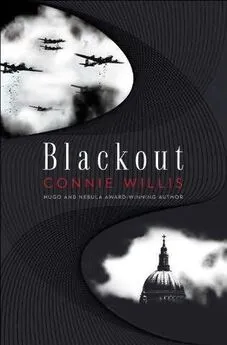Connie Willis - Blackout
- Название:Blackout
- Автор:
- Жанр:
- Издательство:неизвестно
- Год:неизвестен
- ISBN:нет данных
- Рейтинг:
- Избранное:Добавить в избранное
-
Отзывы:
-
Ваша оценка:
Connie Willis - Blackout краткое содержание
In her first novel since 2002, Nebula and Hugo award-winning author Connie Willis returns with a stunning, enormously entertaining novel of time travel, war, and the deeds—great and small—of ordinary people who shape history. In the hands of this acclaimed storyteller, the past and future collide—and the result is at once intriguing, elusive, and frightening.
Oxford in 2060 is a chaotic place. Scores of time-traveling historians are being sent into the past, to destinations including the American Civil War and the attack on the World Trade Center. Michael Davies is prepping to go to Pearl Harbor. Merope Ward is coping with a bunch of bratty 1940 evacuees and trying to talk her thesis adviser, Mr. Dunworthy, into letting her go to VE Day. Polly Churchill’s next assignment will be as a shopgirl in the middle of London’s Blitz. And seventeen-year-old Colin Templer, who has a major crush on Polly, is determined to go to the Crusades so that he can “catch up” to her in age.
But now the time-travel lab is suddenly canceling assignments for no apparent reason and switching around everyone’s schedules. And when Michael, Merope, and Polly finally get to World War II, things just get worse. For there they face air raids, blackouts, unexploded bombs, dive-bombing Stukas, rationing, shrapnel, V-1s, and two of the most incorrigible children in all of history—to say nothing of a growing feeling that not only their assignments but the war and history itself are spiraling out of control.
Blackout - читать онлайн бесплатно полную версию (весь текст целиком)
Интервал:
Закладка:
He felt a rush of relief. It’s the fever, he thought. You’re not thinking clearly. You can’t have altered events. The laws of time travel won’t let you. But they weren’t supposed to have let him get anywhere near a divergence point either. And Hardy had said-
“Here, these will make you feel better,” the nun said, handing him two tablets and a glass of water. Thank God, he thought. At least they’d had aspirin. He swallowed them eagerly and lay back. “Try to sleep,” she whispered and continued through the ward, her flashlight bobbing like Jonathan’s had in the water, signaling Hardy.
Historians can’t change history, Mike told himself, clenching his chattering teeth, waiting for the aspirin to take effect. If my unfouling the propeller would have altered the course of the war, the net would have sent me through a month later. Or to Scotland. Or it wouldn’t have let me through at all. And the reason the retrieval team’s not here is because it never occurred to them to look in a convent.
But when Sister Carmody came to take his temperature in the morning, he asked her if he could see a newspaper so he could make sure the war was going the way it was supposed to. “You must be feeling better,” she said, smiling her pretty smile. “Do you think you could sit up and take some broth?” and when he nodded, hurried off, to return shortly with a bowl of broth.
“Did you bring the newspaper?” he asked.
“You mustn’t worry yourself over the war,” she said brightly, helping him sit up and propping pillows behind his back. “You must concentrate all your energy on getting well.”
“What energy?” he said. Sitting up in bed, even with her help, took a tremendous effort, and when Sister Carmody handed him the bowl, his hands shook.
“Let me help with that.” She took it from him. “Has anything come back?” she asked, feeding him a spoonful of broth. “Have you remembered what happened? Or the unit you were with?”
Maybe he should tell her he’d remembered so they’d transfer him to a civilian hospital where the retrieval team could find him. But what if they’d already checked the civilian hospitals and determined he wasn’t there? And a different doctor might be determined to operate. “No, not yet,” he said.
“You talked a good deal when you first came,” she said. “You kept murmuring something about a ‘drop.’ We thought perhaps you might be a parachutist. Isn’t that what they call it when they jump out of the plane, making a drop?”
“I don’t know. Did I say anything else?”
“He said ‘Oxford,’” Fordham said from the bed next to him.
“Oxford. Could that be where you’re from?” the nun asked.
“I don’t know,” Mike said and frowned as if trying to remember. “It might be. I can’t-”
“Well, you mustn’t worry,” she said, and offered him another spoonful, but it was too much effort to even sip at it. He waved the spoon away and lay back against the pillows, exhausted, and he must have fallen asleep because when he opened his eyes, she was gone.
“Did you bring me a newspaper?” he asked when she came to take his temperature again.
“Your fever’s back,” she said, writing it in the chart. “I’ll fetch you something for it.”
“Don’t forget my newspaper,” he said, and when she returned without it and with the blessed aspirin, he said slyly, “I thought seeing a paper might help me to remember.”
“I’ll see what I can do,” she said and left.
“Which is what she always says when I ask her out,” Fordham said. “It means no.”
Asked her out? But he was a mere boy, and she was a nun-
“I don’t blame her,” Fordham said. “I couldn’t exactly take her dancing, could I? And by the time I’m out of this bed, she’ll already be engaged to one of the doctors,” but Mike had stopped listening.
She wasn’t a nun, in spite of the wimple and veil, in spite of the title “Sister.” She was a nurse. Which I’d have known if I’d had time to research this era properly. But if she wasn’t a nun, then this wasn’t a convent, and his theory of why the retrieval team hadn’t found him didn’t hold water. So where were they? They should have been here long before now.
Unless they didn’t exist. Unless the net had malfunctioned and let him go through to somewhere he wasn’t supposed to be and he had altered the course of events. Unfouling the propeller wasn’t the only thing he’d done. He’d steered the Commander around that submerged sailboat, he’d helped sailors up over the side, he’d hoisted a dog on board. And in a chaotic system, any action, no matter how inconsequential, could affect-
“Sister Carmody!” he shouted, struggling to sit up. “Sister Carmody!”
“What is it?” Fordham said, alarmed. “What’s wrong?”
“I’ve got to see a newspaper! Now!”
“I have yesterday’s Herald here,” Fordham said. “Will that do?”
“Yes.”
“The problem is how to get it to you. I can’t reach far enough to get it over to you, I’m afraid. Can you get out of bed, do you think?”
I have to, Mike thought, but when he tried to sit up, hot and cold and nausea washed over him, and he had to lie back, swallowing hard.
“I could read it to you, if you like,” Fordham offered.
“Thank you.”
Fordham patted around on the bed for the newspaper and propped it up against his elevated arm. “Let’s see, a rector in Tunbridge Wells rang his church’s bells in violation of the official edict that they’re only to be rung to signal invasion-”
That’s why I didn’t hear the bells that night on the beach, Mike thought.
“-and was fined one pound ten,” Fordham said. “There’s been an overwhelming response to Lord Beaverbrook’s Spitfire drive. They’ve collected five tons of aluminum saucepans alone. Sir Godfrey Kingsman is rehearsing a new production of King Lear at-”
“Isn’t there anything about the war?”
“The war… let’s see…” Fordham muttered. “A barrage balloon broke loose from its moorings and drifted into the spire of St. Albans Church and damaged some of the slates.”
“I meant, news about how the war’s going.”
“Badly,” he said. “As usual. The Italians hit one of our bases in Egypt-”
Egypt? Had Britain been in Egypt in August? He didn’t know enough about the war in North Africa to know what was supposed to have been happening there then. “What about the…?” He hesitated. Had they been calling it the Battle of Britain at this point? “-the air war?”
Fordham nodded. “The Germans attacked one of our convoys yesterday, and the RAF shot down sixteen of their planes. We lost seven.” He turned the page, rattling the sheets. “Good Lord, the Prime Minister-”
“What about the Prime Minister?” Mike said sharply. Oh, God, what if something had happened to Churchill? England could never have won the war without him. If he’d been killed-
“He looks dreadful in this photograph. It’s of him rejecting Germany’s latest peace proposal, but he looks like a suet pudding.”
Mike let out the breath he’d been holding. England was still refusing to surrender, the RAF was still holding off the Luftwaffe, and Churchill was all right.
Fordham had finished the news stories and was reading the personal ads: “Anyone having information regarding the whereabouts of Pvt. Derek Huntsford, last seen at Dunkirk, please contact Mr. and Mrs. J. Huntsford, Chifford, Devon.” Fordham shook his head. “He must not have made it back. He wasn’t as lucky as you, poor chap.”
Lucky, Mike thought. But at least he hadn’t altered events. And the war was still on track.
Fordham was reading another ad. “To let, country home in Kent. Restful location…”
Restful, Mike thought, and fell asleep.
He jerked awake to the up-and-down wail of sirens. And shouting. One of the patients, in pajamas and bare feet, was waving a flashlight wildly around the dark ward. “Wake up!” he shouted, shining the light full in Mike’s face. “They’re here!”
“Who’s here?” Mike said, trying to shield his eyes from the blinding light.
“The Germans, they’ve invaded. I only just heard it on the wireless. They’re coming up the Thames.”
I do not get panicky. I stay put. I say to myself: Our chaps will deal with them. I do not say: I must get out of here.
– INVASION INSTRUCTIONS, 1940Warwickshire-August 1940
THE ARMY GAVE THEM TILL THE FIFTEENTH OF SEPTEMBER to vacate the manor, before which they had to cover all the furniture, crate Lady Caroline’s ancestor and the other paintings, pack away the crystal and china, and keep Alf and Binnie from “helping.” When Eileen went to take down the priceless medieval tapestry, she found them tossing it out the window. “We was tryin’ to see if it was magic,” Binnie said. “Like that flyin’ carpet in the fairy story you read us.”
They also had to make arrangements for the evacuees still at the manor. Mrs. Chambers found new homes for the Potters, the Magruders, Ralph and Tony Gubbins, and Georgie Cox. Mrs. Chalmers came and took Alice and Rose, and Theodore’s mother wrote to say that she would be up on Saturday. Eileen was relieved. She’d been afraid she’d have to send him kicking and screaming on the train again. “I don’t want to go home,” Theodore’d said when she told him his mother was coming. “I want to stay here.”
“You can’t stay ’ere, you noddlehead,” Alf said. “Nobody’s stayin’ ’ere.”
“Where are we goin’, Eileen?” Binnie asked.
“That hasn’t been arranged yet.”
They’d written Mrs. Hodbin but hadn’t had an answer, and no one in Warwickshire would take them. “I’ve written the Evacuation Committee,” the vicar said, “but they’re swamped with billeting requests just now. Everyone’s afraid the Germans will begin bombing London soon.”
They will, Eileen thought, and then there’d be no chance at all of placing Alf and Binnie. More than a hundred thousand children had been evacuated from London after the Blitz began. They needed to find Alf and Binnie a home immediately.
Lady Caroline had sent Samuels ahead with her trunks to Chadwick House, where she was going to stay with the Duchess of Lynmere, which left Eileen, Una (who was useless), and Mrs. Bascombe to finish preparations for the Army’s arrival on their own. And no time for Eileen to check the drop or go to Backbury to ask if anyone had been inquiring after her. Or to look for another position.
If she could find one. A number of households were making “wartime economies,” which meant they were cutting back on the number of their servants, and there were no “Housemaid Wanted’s” in the Backbury Bugler. Una had announced she was joining the ATS, and Mrs. Bascombe was going to Shropshire to help out a niece whose husband had joined up, so Eileen couldn’t stay with either of them, and Backbury had no inn, even if she had enough money for one. And even if she did stay, there was no guarantee the drop would open or that a retrieval team would come. It had already been nearly four months.
You’re going to have to find another way of getting home, she thought. She needed to go to London, find Polly, and use her drop. If she’s there.
She wasn’t coming till the Blitz. It would begin in September-Eileen didn’t know the exact date. I should have asked Polly, she thought, but it had never occurred to her she’d still be here when Polly arrived. And the Army didn’t take possession of the manor till the middle of September. The Blitz would surely have begun by then.
Читать дальшеИнтервал:
Закладка:

![Jane_BlackCat - Понять не поздно... [СИ]](/books/1148838/jane-blackcat-ponyat-ne-pozdno-si.webp)
![Jane_BlackCat - За краем Вечности [СИ]](/books/1148839/jane-blackcat-za-kraem-vechnosti-si.webp)

